#what a weird rant
Explore tagged Tumblr posts
Text
(I promise I reach a conclusion at the end bear with me)
Something I've really noticed is that whenever people are around, Apollo gets really queasy when it comes to the human body. An example is The Grey Sisters' eyeball, he immediately got squeamish and screamed about how gross that was. He becomes an awful doctor/healer, randomly prescribing aspirin to everything.
But the moment there isn't someone around or a healer in sight he immediately becomes the best doctor in the world??? He got grossed out by an eyeball but as soon as he saw Lu's cut-off and mutilated arms, he didn't flinch and healed her almost fully with a tiny speck of godly power and a first aid kit.
Same thing with Frank he panicked and went straight to business as he realized that action needed to be taken immediately and cutting off his reunion with Artemis.
And I say he does this on purpose to encourage maybe his children to take action in situations he knows they can and he won't show off vital skills just like that. Apollo lets people do it because they need to learn this in order to survive, and my guess is he's been doing this for millennia to let humans and demigods alike to grow more proficient and confident in their skills so that they do not need him.
When Artemis said Apollo wasn't as good as Asclepius in healing because he didn't really practice and didn't care and that it would take too much time, she was wrong. He probably worked on his healing ability for centuries and just wouldn't show it. When Frank fainted, immediately his reflexes kicked in to save him which is an obvious sign.
Not only that, he said so himself that he had collected the spit of so many animals to check their healing properties in the first book, and unfortunately did not do lions. That just shows commitment.
What am I trying to prove here? Not a clue, just that everyone's wrong about him and he's an actual healer god, one of the best there is, but just doesn't show it to encourage others to become doctors and save people, which is literally the best thing they can do in life. Apollo is gifting them a once-in-a-lifetime opportunity to do so much good.
The main point of ToA is healing and recovery. Mostly from Zeus' abuse in this case and how he tried to save everyone unlike the god of destruction everyone thinks he is.
My belief is that Apollo's main domain is healing and all his other ones are kinda a part of that. Music no need to go into, the sun is rejuvenating and represents a fresh start, prophecies are all about knowledge, which can also be healing, plague is needed to balance it out and is needed sometimes for recovery, and archery connects with the plague which shows death is needed for life and is in fact vital.
Apollo is the god of healing.
#lester papadopoulos#trials of apollo#toa apollo#toa#apollo#pjo apollo#healer apollo#make this a thing guys#wow i can't believe i reached a suitable end#what a weird rant#HEALER APOLLO!!!!
256 notes
·
View notes
Text
i thought i was at my lowest but holy shit it gets lower
#woke up feeling more lost and out of touch with myself.. my surroundings and my partner all in the span of a night.. what the hell..#i really need a new therapist. specifically a dbt therapist but i have really weird health insurance so there's not many options..#i just really need someone that i feel open enough to talk to about anything and that will actually help me and not just use the dumbass#worn out therapist lines..#bpd shitposting#actually bpd#actually mentally ill#bpd#actually borderline#bpd vent#bpd fp#bpd favorite person#bpd mood#bpd problems#sorry 4 the long rant in tags :/
6K notes
·
View notes
Text
How The Nocturnal Bottleneck and Nipples Make Us Human
Almost every post here considers what humans do have, really. It’s a little tiring; realistically every world has its harsh environments and vicious species and a sophont to match. We probably wouldn’t be unique for our adaptability or our persistence or even adrenaline
But our evolution is fucked up as hell, to put it lightly.
Mammals went through what’s been dubbed the nocturnal bottleneck essentially since the start of the mesozoic right up until the Cretaceous ended the archosaur’s exclusive hold over the daylight. We lost a lot of things from every mammal spending most of its time in either a cramped, suffocating burrow or scrounging around in the faint hours of nighttime. Our blood cells lost their nuclei to hold more oxygen while we spent time deep underground, we lost protections against ultraviolet rays in our skin and eyes, we can’t even repair our own DNA using the light of the sun. Most aliens probably wouldn’t have such traits unless their evolution followed a very similar path to ours. They’d be able to see ultraviolet and wouldn’t have to worry about sunburn and all the wonderful privileges essentially all fish, birds, amphibians, and reptiles enjoy as we speak.
There’s also what we gained from spending so much time in the dark.
Brown fat is only found in mammals, it’s a special type of fat which bear cells with several oil droplets and are utterly jammed with mitochondria. This lets it make heat, a lot of it, fast. We don’t even need to shiver to induce this heat generation from brown adipose tissue - factor in our downright hyperactive mitochondria, and we can warm up quickly. Sure, it doesn’t have too much use in adult humans, but it keeps our infants warm and still provides a little boost the whole run we have in this universe.
Unless aliens also went through a time where their small ancestors had to face cold nights, they’d have to produce heat the old fashioned way when chilled. Aliens might have to shiver the whole time they’re in a cold room while the human watches in confusion, quite literally unshaken, and wonders if the room is a lot colder than the thermostat set to 60 says. The aliens stare at their companion in confusion, it’s just a normal temperature to shiver at after all, how is the human sitting so still?
Our small ancestors spending all their time out foraging at night is also why we have such a good sense of touch, smell, and hearing. They were more important senses than vision (we’re lucky to have even redeveloped basic color vision, frankly) at the time and place and simply ended up continuing to serve us well. Birds and reptiles rarely have acute senses of smell and the latter especially are lucky to have acute hearing, and birds rarely have impeccable hearing themselves either. Our skin is free of scales and honed to sensitivity, and our external ears and complicated ear bones provide an immense range of hearing (from 20 all the way to 17,000 hertz!).
Aliens might not be able to pin down the chirp of a cricket or the light click of a lock being picked. The human might be the only one on board a ship that can pick out the finer sounds of the engine’s constant thrum and know the critical difference between when everything is fine and when something is wrong. The human could probably pick out the sounds of an approaching enemy’s careless footsteps - they’re only as light enough for *them* to stop hearing them, after all - and be the one to see the horrified expression (well, more on that later) on their face when we get the drop on them in spite of their perceived stealth.
But perhaps the most versatile, convoluted, amazing, and utterly unique trait we have is right on your face this instant. Lips.
Lips in most animals are a simple seal to hold in the mouth’s moisture and protect the teeth, even if they’re supple they’re NEVER muscular except in mammals, and we have only one thing to thank for it; milk and nipples. Lips evolved exclusively to allow babies to suckle, it required a vacuum to be created in the mouth, and with no other animal having anything like a nipple it never happened in other animals. Many animals make milk, to be frank, but no other animal has nipples.
Your cheeks and lips are a marvel among tetrapods, no other animal can suck like mammals can. Aliens wouldn’t have straws or even be able to sip from the edge of a glass, they’d have to have a proboscis or simply tilt the whole thing back. Aliens likely won’t have woodwind instruments or balloons you can blow into. We take so much about our lips for granted. Hell, our muscular faces are vital for expressions, we’re probably absolute facial contortionists among a cast of creatures with mandibles and beaks and expressionless scaly maws. Aliens might find us ridiculously easy to read, if anything, compared to their own kind (all the better to deceive them) - or perhaps they’d find us hard to decipher anyways, with our lack of color-changing skin or erectable crests of bright feathers. Baring teeth might not be seen as a sign of aggression in most of the universe, smiling would be all too distinctly human.
Perhaps with how infectious we are sometimes, that’s what we’d contribute to the universe; others might have to make do with opening their mouths just enough to show their teeth or splaying their innumerable mouthparts with just the right curve, but perhaps we’d teach the galaxy to smile, one ally at a time.
Wouldn’t that be amazing?
#humans are space fae#humans are space orcs#humans are weird#humans are strange#I’m seeing a lot of people in these tags just kind of disregard the nature of life and the universe#Unfortunately there probably aren’t mediterranean worlds without desert ‘nor tundra and life easy enough that losing a limb#wasn’t considered evolutionarily advantageous to be able to survive.#There will be wolves and tigers and bears all the same on alien worlds#and life will probably be hard everywhere in the galaxy#and there will be hatred and wars and love and hope and the burning feeling in thing’s vital organs when they just need to go a little more#and that’s what makes it life.#Sorry for ranting in the tags lol…
4K notes
·
View notes
Text
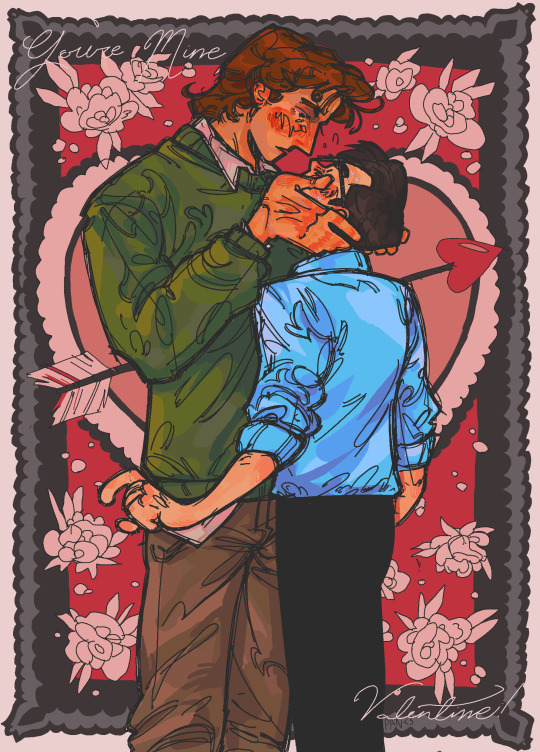
i think dan should get to be a little weird too. as a treat
#my art#re animator#herbert west#daniel cain#dan cain#danbert#no but srsly guys i get that hes the normal guy but you forget ... HES ALSO WEIRD !!! HES SO STRANGE !!!#if he was normal he would have called the cops on herbert ages ago#but guess what babey he ... well technically he did call the cops but he waited like 20 years to do it so .. !!#bro was an enabler dont forget that#sorry im like rlly crazy about dan...#which is unfortuante bc i feel kind of alone in that like YES herberts a baddie YES hes litterally me#but dan....... DAAAAAAAAAAAN (eagle screeching)#what the fuck am i saying!#edit hey guys its actually lucid dog that rant you see above you was written at likes 6am after an all nighter#we all know dan is weird i mainly meant i think he should get to be PORTRAYED as weird more#really im just weird about him (<3) and i need him to reflect that
2K notes
·
View notes
Text
It's interesting (if often frustrating) to see the renewed Orc Discourse after the last few episodes of ROP. I've seen arguments that orcs have to be personifications of evil rather than people as such or else the ethics of our heroes' approach to them becomes much more fraught. Tolkien's work, as written, seems an odd choice to me for not wrangling with difficult questions, and of course, more diehard fans are going to immediately bring up Shagrat and Gorbag.
If you haven't read LOTR recently, Shagrat and Gorbag are two orcs who briefly have a conversation about how they're being screwed over by Sauron but have no other real options, about their opinions of mistakes that have been made, that they think Sauron himself has made one, but it's not safe to discuss because Sauron has spies in their own ranks. They reminisce about better times when they had more freedom and fantasize about a future when they can go elsewhere and set up a small-scale banditry operation rather than being involved in this huge-scale war. Eventually, however, they end up turning on each other.
Basically any time that someone brings up the "humanity" of this conversation, someone else will point out that they're still bad people. They're not at all guilty about what they're part of. They just resent the dangers to themselves, the pressure from above, failures of competence, the surveillance they're under, and their lack of realistic alternative options. The dream of another life mentioned in the conversation is still one of preying on innocent people, just on a much smaller and more immediate scale, etc.
I think this misses the reason it keeps getting brought up, though. The point is not that Shagrat and Gorbag are good people. The point is that they are people.
There's something very normal and recognizable about their resentment of their superiors, their fears of reprisal and betrayal that ultimately are realized, their dislike of this kind of industrial war machine that erases their individual work and contributions, the tinge of wistfulness in their hope of escape into a different kind of life. Their dialect is deliberately "common"—and there's a lot more to say about that and the fact that it's another commoner, Sam, who outwits them—but one of the main effects is to make them sound familiar and ordinary. And it's interesting that one of the points they specifically raise is that they're not going to get better treatment from "the good guys" so they can't defect, either.
This is self-interested, yes, but it's not the self-interest of some mystical being or spirit or whatnot, but of people.
Tolkien's later remarks tend to back this up. He said that female orcs do exist, but are rarely seen in the story because the characters only interact with the all-male warrior class of orcs. Whatever female orcs "do," it isn't going to war. Maybe they do a lot of the agricultural work that is apparently happening in distant parts of Mordor, maybe they are chiefly responsible for young orcs, maybe both and/or something else, we don't know. But we know they're out there and we know that they reproduce sexually and we know that they're not part of the orcish warrior class.
Regardless of all the problems with this, the idea that orcs have a gender-restricted warrior class at all and we're just not seeing any of their other classes because of where the story is set doesn't sound like automatons of evil. It sounds like an actual culture of people that we only see along the fringes.
And this whole matter of "but if they're people, we have to think about ethics, so they can't be people" is a weird circular argument that cannot account for what's in LOTR or for much of what Tolkien said afterwards. Yes, he struggled with The Problem of Orcs and how to reconcile it with his world building and his ethical system, but "maybe they're not people" is ultimately not a workable solution as far as LOTR goes and can't even account for much of the later evolution of his ideas, including explicit statements in his letters.
And in the end, the real response that comes to mind to that circular argument is "maybe you should think about ethics more."
#i had a whole 'nother tangent that i split off into a separate draft#but i've been thinking about why the 'but shagrat and gorbag are still BAD people' thing seems so inane and missing the point#but yeah. i feel like people desperately want to find some justification in tolkien (and elsewhere) for the idea#that doing something wrong to a person will become doing something right if you can find someone who 'deserves it'#and that literally anything can be justified if someone has been defined as a valid target (i.e. less than a person)#(you see this a lot in the whole twitter main character of the day thing - the idea that the problem is directing the firehose#against the wrong person by mistake rather than the firehose itself)#but it's super weird for a novel built on a metaphor about how using the tools of evil for a good end or against existential enemies#is fundamentally corrupting and only further props up what it's meant to oppose#and i mean... the character most like tolkien literally says he could not morally justify lying to an orc and rejects the ring#it's not exactly a deeply buried theme of the book#anghraine babbles#long post#anghraine rants#legendarium fanwank#legendarium blogging#shagrat#gorbag#tv: lotr#jrr tolkien
669 notes
·
View notes
Text



Can we talk about this Rescue Bots episode (Spellbound) because I need to appreciate how TERRIFYING it is??? Especially considering it's cannon in the Aligned Universe. This is some A+ horror.
Like damn, some of Griffin Rock's technology is more powerful than even the Decepticon's tech.
Can you IMAGINE if those creepy mind-control cell phones were used in TFP?
Legit mind control that effects humans AND Cybertronians?
And it's SO UNSETTLINGLY subtle, too. The victim's voices sound like their normal selves but just SLIGHTLY off. *shutter* The voice actors did such a good job.
Just IMAGINE that in Prime.
I feel like Optimus would probably be immune (because the Matrix of Leadership is goated) but can you imagine the Jasper Trio getting mind-controlled, and all their guardians + Ratchet know SOMETHING is off, but not what? Then, slowly, the mind control spreads to the Bots? Or vice versa, the Bots go first, and the humans are like: "Something's up with my guardian."
Kinda wild that Invasion of the Body Snatchers shit 100% exists in TFP's world. Felt like I needed to acknowledge that.
Is this gonna be my next TFP headcanons post? Feeling inspired.🤔
#Also the weird garbled sounds the phones make are so creepy? Makes you wonder what the heck it's DOING to their brains#if you haven't seen that episode and like psychological horror I strongly recommend#Aligned continuity is unhinged and I love that#spellbound appreciation#transformers prime#transformers#tfp#rescue bots#transformers rescue bots#aligned continuity#tfp optimus prime#tfp ratchet#tfp raf#tfp miko#tfp jack#tfp arcee#tfp headcanons#tfp bulkhead#tfp bumblebee#tfp rant#rambles
654 notes
·
View notes
Text
Everyday I mourn the fact that we did not get more bill and twelve content
#I loved bill and one season felt like too little time with her#also weird professor twelve my beloved#I would have loved an episode centered around something happening at the university if only so we could see more of what his#classes are like#he absolutely goes on random and completely unrelated rants about things he his students should know#or honestly just things he wants to talk about#doctor who#twelfth doctor#bill potts
319 notes
·
View notes
Text
That viral post that's going around about how people who write "book quality" mlm fic are too "normal" to publish and have real jobs so only "weird" people publish their "shitty" fanfic is so completely out of touch with reality and I am giving a massive side eye to everyone reblogging it.
Not only is it completely, easily verifiably untrue (you cannot enter any professional writing space without tripping over a dozen grizzled scifi writers who got their start by filing off the serial numbers and publishing their Star Trek fanfic even going back decades ago??? it's a whole thing?? plus how can you look at the mlm category on Amazon right now and say with a straight face that people aren't publishing shitty Spirk and Stucky fanfic??? Oh, honey...) it's also the perfect example of this kind of sneering elitism that true artists would never sully themselves by seeking profit, they do it only for the purity of the thing that always somehow leads back to, "no one should be paid to make art, actually."
The only reason you're seeing more published fanfic right now has nothing to do with the idealistic purity of your hypothetical government employee written smut of the past vs the debased scribbles of those awful straights of today and everything to do with the fact that a) self-publishing has created a voracious readership that wants a ton of content so it's become a viable, flexible income stream for many, especially disabled people b) anyone can publish now with self-publishing tools so there are less gatekeepers and c) lockdown got a lot of people into fandom and therefore writing who never tried it before.
And if you really think there's no "shitty" published mlm and no "book-quality" m/f writing out there that started as fanfic, then you are clearly not a reader so why are you even talking about this?
#love how they manipulated people into spreading that post by making it seem like a cishet vs gay thing#when the real message is OP thinks trying to sell your writing is cringe and 'weird' and 'normal people' with jobs would never#which would of course never have flown on the fandom website#so they played into the queer shipping is purer than cishet shipping puriteen thing#and it worked!#because my god people are gullible#this is the direct pipeline that leads to AI thievery#''normal' people write for the joy of it anyway so why do you need pay? you are just greedy and 'weird'!'#'oh no this isn't about who we get to call cringe and who gets to profit from art it's about um...#(quick what's a hated m/f ship?).. oh uh 'shitty' REYLO#and not our super pure uh... (spirk is still popular right? lets throw in that avengers one too to make it seem timely) stucky!'#I'm sorry if I have no sense of humor about this but the year is 2024 and people are still way too ready to sneer#about writers trying to earn a fucking living in the shittiest timeline#and i need you to look deep into yourself and ask you why it's so important to you to tell yourself that only people writing what you like#are 'normal' with real jobs and to vilify everyone else as 'weird' and 'shitty'#for trying to make an income during a financial fucking crisis#i would say sorry for ranting about this but I'm not sorry because wtf#write whatever you want#publish whatever you want#there is no moral fucking purity in what the content is#and one thing certainly doesn't make you more 'weird' or 'normal' than the other#like there is soooo much shitty mlm that started as fanfic???#that post is 100% OP made up some guys to get mad about and called them relyos for the clicks#writing#publishing#writblr#writeblr#i wasn't going to tag this anything but you know what fuck it I'm mad#i had like 5 more tags but tumblr cut me off which is fair 😅#fan fiction
489 notes
·
View notes
Text
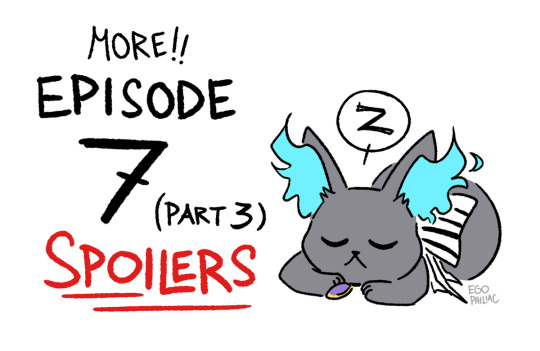
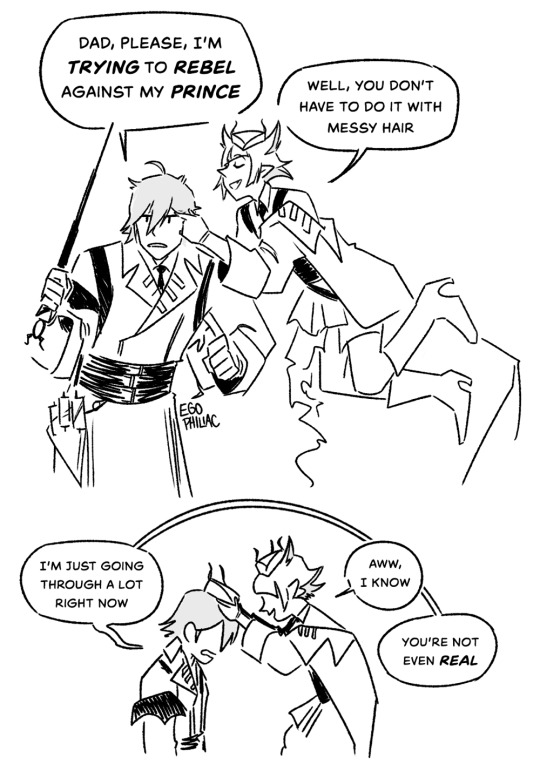
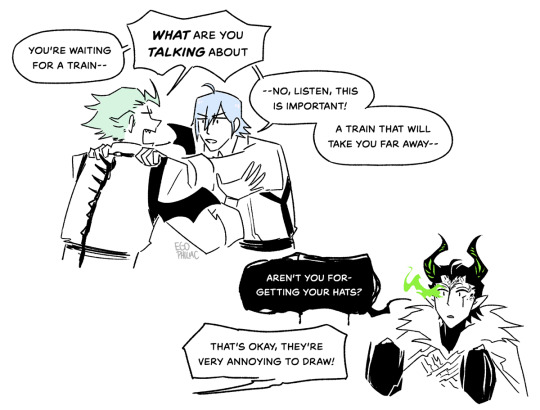
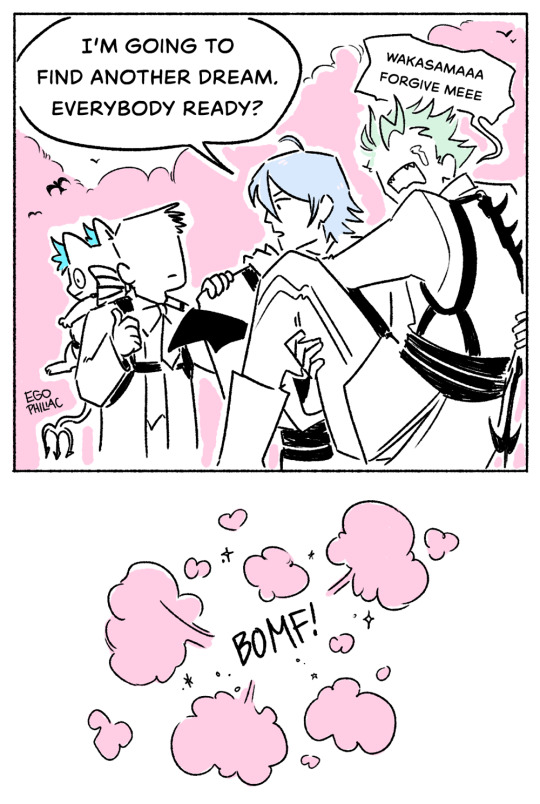

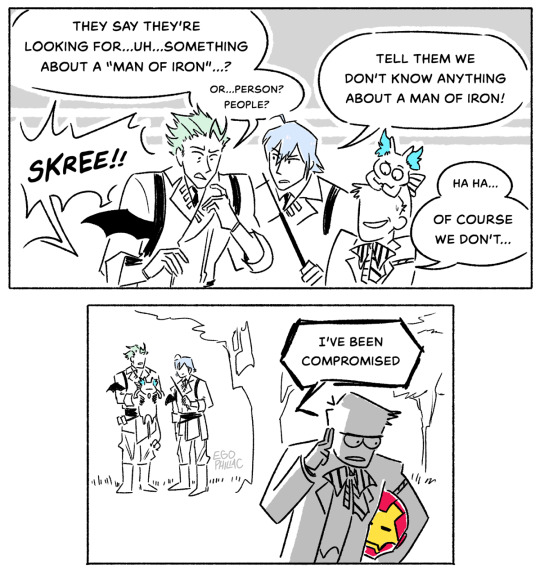
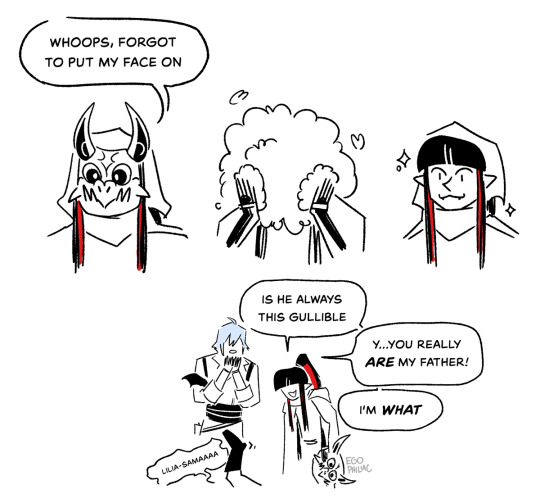
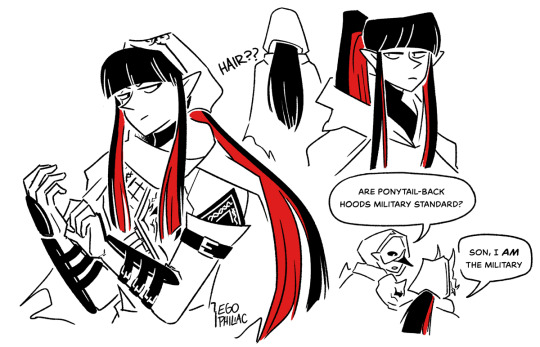
a bunch of assorted episode 7 stuff from the last couple of days! because they're still taking over my entire brain! (I keep forgetting that the diasomnia uniform has that weird spike...chain...thing on the back. do you think when they get bored they, like, throw balloons at each other and whoever pops one first wins? is this what the dialounge is like in the off-hours?)
hey when do we get to see maskless red Lilia. please Twst I'm dying over here
#art#twisted wonderland#twisted wonderland spoilers#twisted wonderland episode 7 spoilers#twisted wonderland book 7 spoilers#long post#i just really loved that sebek drags in a very upset silver who starts going off on a rant about how none of this is real#and dream!lilia is just like 'aw my baby' and starts fixing his hair#and this was sebek's dream! sebek's lilia was just being real sweet to everyone. adorable.#anyway SO LILIA'S DREAM HUH?#the soldiers wearing animal masks -- and ESPECIALLY the guy in the bird mask -- have made me so suspicious#the implications!#what does this mean for crowley!#WHO IS HE REALLY#auuuughhh waiting for the next part is going to be agonizing#i will continue to analyze each pixel of lilia's sprite to try to figure out how his hair is doing that while he's wearing a hood#speaking of#drawing serious lilia feels weird. he doesn't look like himself. :(#i straightened his bangs and i think that was a mistake#if lilia takes off his mask and his bangs don't still look like he cut them himself in the dark while in a rowboat during a storm#i'm going to be sad
3K notes
·
View notes
Text
me: finally accepting theres a good chance im autistic and starting to work up the courage to ask my parents to see if i could get a diagnoses but being scared to
my mom: do you ever think you have adhd? if you want to do a screening for add next time your at the doctors you can
me:

#for context im terrified of being the person who sees stuff online and diagnosis themselves and then is wrong#which is why it took me so long to accept im —probably— autistic (bc now i have done research and stuff for it)#and id see adhd things that were relatable but i felt i related more to the autism + self diagnosing both felt weird (for me not in general#but now like. my mom is willing to accept i might have add??#(there was a long talk in between her asking if i ever thought i had it and her saying i could get a screening where we both agreed that#—if i did have it— i didnt have the hyperactive part. hence the add vs adhd thing)#and now that kinda through off my plans because like. what if i do also had adhd. or something#so yeah small crisis woo#i need to actually look i to symptoms and stuff for adhd though#because im not saying anything til i know more about it and if i actually do have a lot of the things#but this also gives me a chance go write about the autism things as well bc i told my mom i would look into the adhd#so now i can hopefully find a way to bring that up#ive mentioned that autism is a spectrum recently which i didnt think she knew before#so progress i guess#wow long rant in the tags whoops#jasper’s posts#moots have some jaz lore i guess
140 notes
·
View notes
Text
Thoughts on Echo as amputee/disability representation
First and foremost, I am not disabled or an amputee and I don’t claim to speak for those communities (and if I was I couldn't speak for everyone). What little I do know mostly comes from this youtube channel (@oakwyrm), this post, and other research I’ve done for my writing (and like one amputee I kinda knew in passing). By all means correct me and add to the conversation, I just have some thoughts I want to share because I haven’t really seen this discussed anywhere
Overview
So Echo is interesting. He is a triple amputee which is pretty rare in media. His disabilities come from extremely traumatic circumstances: injured in a near-death experience, imprisoned and dehumanized as an experiment with no autonomy over what happened to his body.
There are a few moments in the shows where Echo is treated… questionably. Like this bit where Rex uses him as an example of the Separatists' evils to convince the locals to fight back:
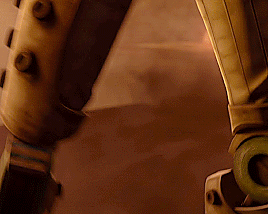
To be fair, yeah Echo’s treatment does prove that the Techno Union is not neutral like they claim. The modifications that everyone is gasping in horror at here obviously weren’t made with comfort and accessibility in mind, nor with Echo’s consent. But you still just want to be sure that “They took away his freedom, his humanity, they tried to turn him into a machine” is about using him as a living computer, not the fact that he is missing limbs.
The Batch is also pretty insensitive toward him and his trauma imo, which is weird considering they've supposedly also faced discrimination for their mutations
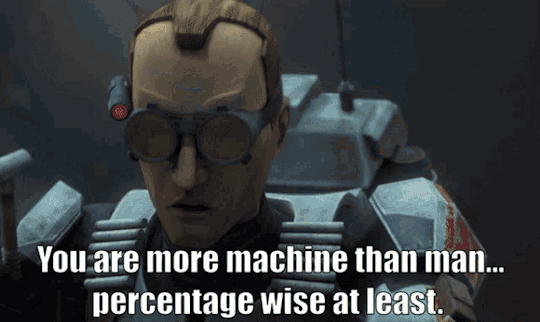
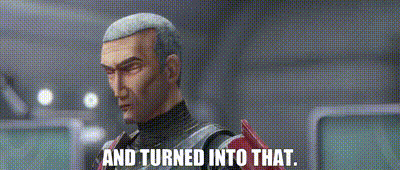
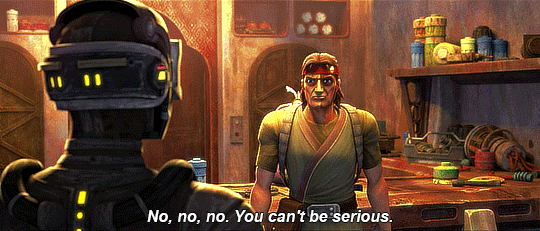
Disabled people do have to deal with stuff like this in this day and age so I guess it can speak to those experiences. I think especially him being mistaken as a droid (and Hunter going along with it (bruh)) might resonate with some people.
Aside from that stuff, Echo isn't really treated any differently as a character/person which is really good (as low of a bar as that is).
We get this moment in CW where Echo contemplates that yeah things are gonna be different now
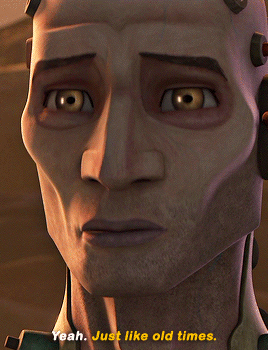
While also (imo at least) showing that he is still the same person regardless, evidenced by the fact that he just echoed Rex :,) I also think it's significant that he joins the Bad Batch on his own terms and we're given a really emotional scene to specifically show that he's not just like 'lumped in with the other misfits' but that it is his choice to go where he feels his place is.
A lot of people, myself included, are disappointed that TBB didn't have more time to explore Echo's PTSD, but I think the one panic attack scene we did get is really good. Even thought it's minor it at least is an appropriate reaction from a guy who was medically tortured (which is more than I've come to expect from Star Wars shows lol)
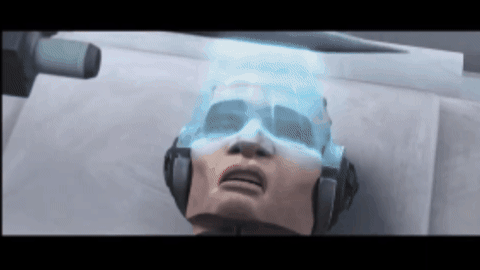
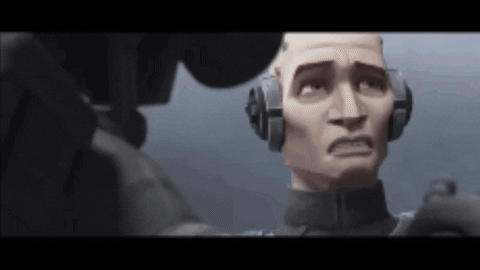
And it's really sweet to see Omega showing Echo some empathy and consideration.
It would have been nice to see more of his adjustment period, and other side effects like chronic pain and maintenance, but there’s a lot of daily life stuff the show never had time for (i.e. we don’t know if he removed his prosthetics to sleep, but we also never saw him sleep anyway). His disabilities might take on a background role (much like the character himself sadly) but for the most part they aren’t invisible or erased, nor do they define his character and arc.
Physical Appearance

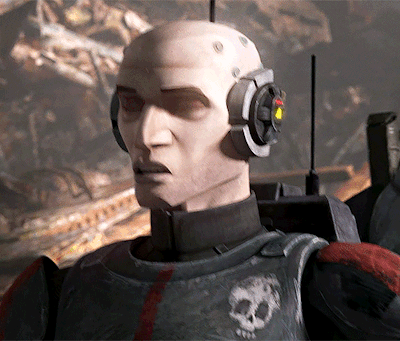
Okay this one is bit dicey, bc on the one hand, yes complaints that Echo’s paleness (most likely caused by burns from the explosion or chemical burns from the cryo-chamber) is whitewashing are totally valid. But I also think you can draw comparisons to real life conditions that affect pigmentation/complexion (like you know burns). So while I understand why a lot of fanart will depict him with his original skin tone and with hair, consider that there are real people who have to live with temporary or permanent changes to their appearance, and the idea of “fixing" him by making him look more like his old self can be problematic.
It's also interesting to note that Echo could act as a reversal of the 'disabled/disfigured = evil' trope. He's pale and bald and wears black and red, which is so often visually associated with villains, but we all know Echo is the bestest boy™
The Headpiece
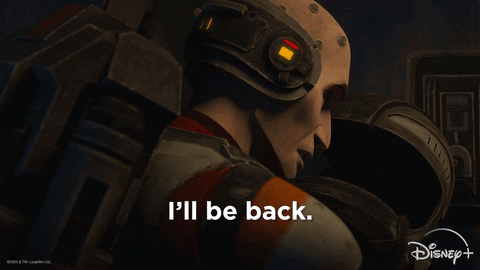
Echo’s headpiece is interesting because within the show we don’t actually ever learn much about it (idk if there is more info in books or whatever bc i don’t have them so?). He didn’t have it in CW so we know it didn’t come from the Techno Union and therefore Echo probably had more choice with it. We don’t know its exact purpose but it’s most likely related to his scomping abilities. When he is hacking with his scomp in CW, before he has his headpiece, it’s clearly very mentally straining:
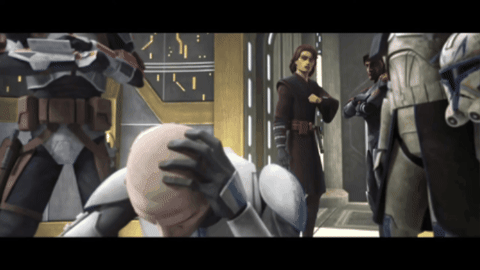
We don’t see him struggling like this in TBB once he does have it (though that could be bc he got more used to it over time). There doesn't seem to be much of an impact when he removes his headpiece in s3 ep14-15, except that he gets stuck in the ports every time he uses his scomp which is not something we’ve seen before:
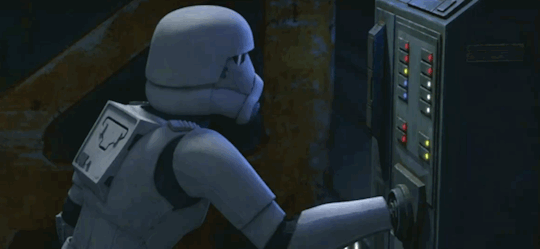
There might not be an exact real-world equivalent, but the headpiece is some kind of accessibility aid. It means that someone specifically designed a device to help him adapt to the changes the Techno Union made, as well as a helmet that integrates it. It’s removable and visually very present, much like a cochlear implant would be. (A lot of people actually headcanon it to act partially as a hearing aid, since it makes sense that Echo’s hearing would have been damaged in the explosion, but there isn't really any indication of this in canon.) The headpiece is never really acknowledged in the show, but I think that's a good thing. It's something he needs/wants and it just exists, completely normalized, and that's pretty cool 👍
Legs
Sigh... So from the very first episode of TBB I was really disappointed that the animation team or whoever completely visually erased Echo’s prosthetic legs (I think we all were, honestly, if fanart is anything to go by). It’s one thing when he’s in armor because he would probably want to protect his prosthetics, but we literally see him in his blacks and there is no indication whatsoever that he lost his legs even though it was not left up for debate at all in CW:
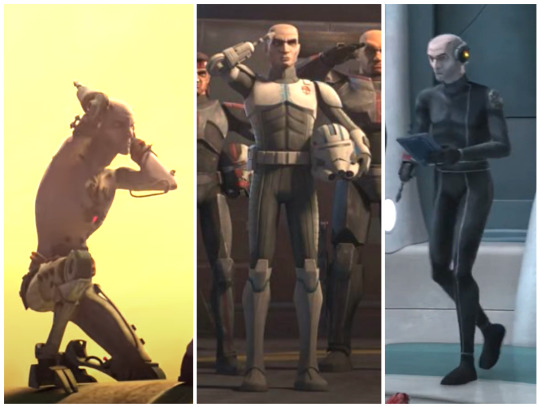
Like ??????!?
This is just really strange to me! Idk what went on behind the scenes with this decision but I don’t really see why it would be that much harder to animate or anything since it’s 3D and they've done it before. We do see some pretty sophisticated cybernetic technology in Star Wars canon that mimics real limbs:
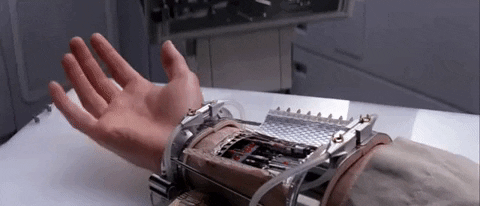
But Luke’s fancy hand is technically 20ish years from now, so Anakin and Maul are more of a representation of what level we could expect here
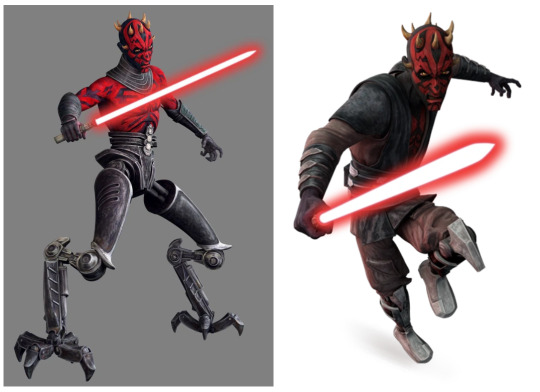
So yeah, for no apparent reason, his leg amputation is effectively, visually and narratively nonexistent. Which is not great 👎
Arm!
The scomp on the other hand (uh lol!) is the complete opposite and I kinda love it!
At first I, like many others, thought it was a bit odd that they didn’t give Echo a prosthetic arm. Losing hands is basically a Star Wars tradition at this point, so robotic arms/hands are well established within the worldbuilding:
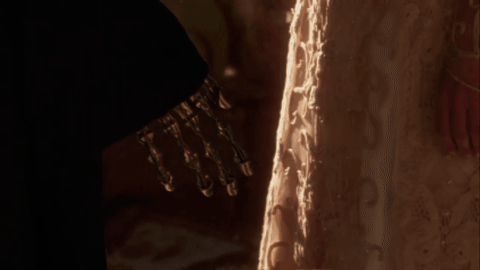
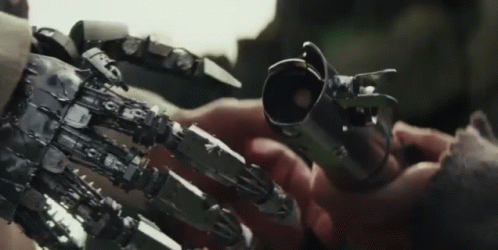
We aren’t necessarily given a canon reason for why Echo doesn't get a cybernetic arm (again unless it's in some lore book I haven’t read, sorry). General fanon explanations I’ve seen are that he either couldn’t because the Techno Union wired the scomp too far into his nervous system, and/or the resources to give him one were deemed too expensive for a clone (what about his legs tho?), or that he chose not to, usually because he thought the scomping was useful.
Regardless, I actually really love this choice (and it's the whole reason I made this post), because here's the thing: There’s a lot of problematic tropes out there that either erase/cure disabilities or compensate them with perks (like how pretty much any blind character is actually not blind by some sort of magic power). With amputees that is done with robotic arms. The character is still an amputee or course, and there is still value in that representation, if this story from Mark Hamill that makes me tear up is anything to go by:
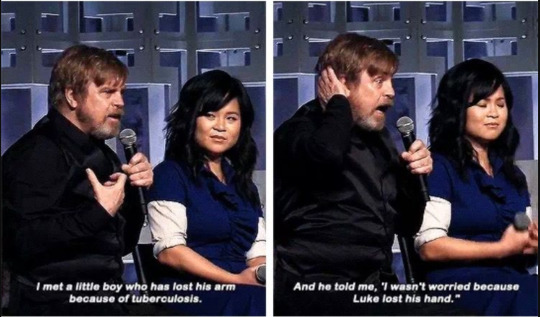
but for the most part these characters function like anyone else, just with a limb that looks a little different. It’s no more than a video game skin, an able-bodied actor with a green screen glove. It “cures” the disability, or it actually makes the character even stronger than usual:
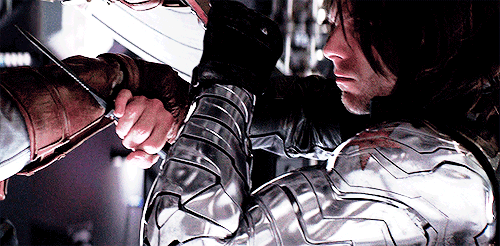
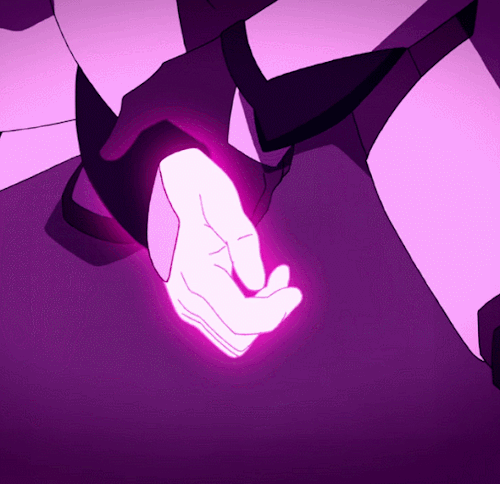
It usually makes sense within the world of the story, but the reason it’s not so great in my opinion is that in the real world we just do not have technology anywhere close to that yet. Prosthetics can more or less replace any mobility from lost legs, but not for all the complexities of a hand (and even if they could the average person wouldn’t be able to afford it).
So
I think it's actually really super cool that Echo’s scomp bypasses the canonically-established amputee erasure and functions much like a stump would irl. He integrates it into his movements and everyday life and it’s (as far as I know) a lot closer to an everyday amputee’s experience.
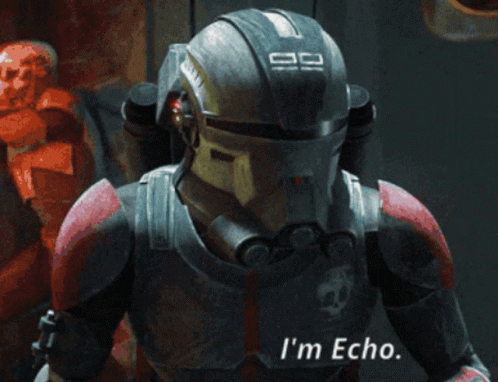
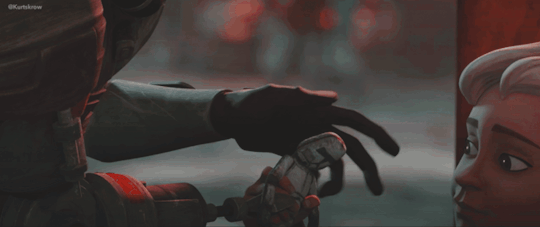
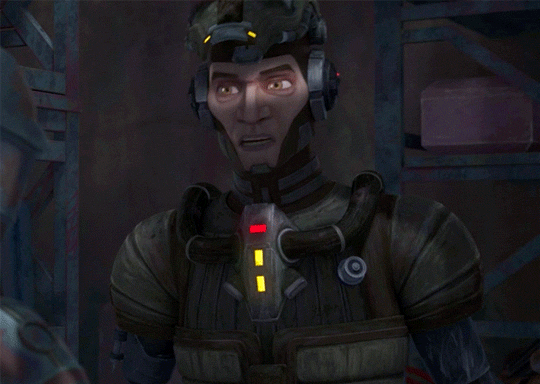
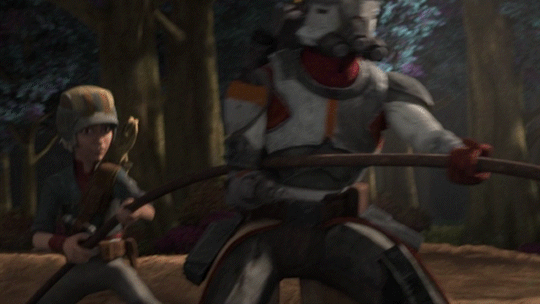

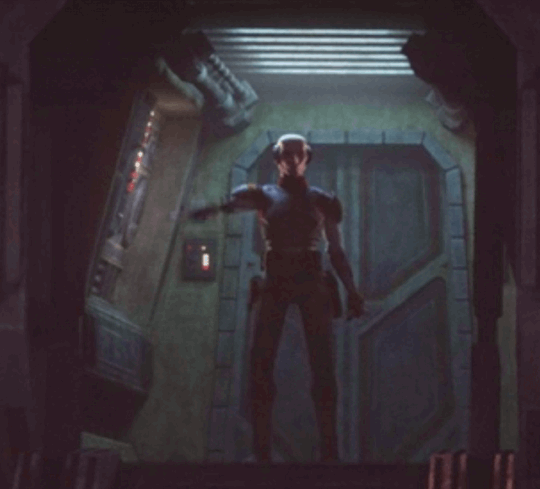
It doesn’t define his character, it doesn’t hold him back, he lives a full life, the other’s don’t treat him any differently, and he’s still a total karking badass
The only additional thing is that he sometimes uses it as a weapon (which given his story, I think it’s cool to see him taking back autonomy in a way, and we only see that like twice)
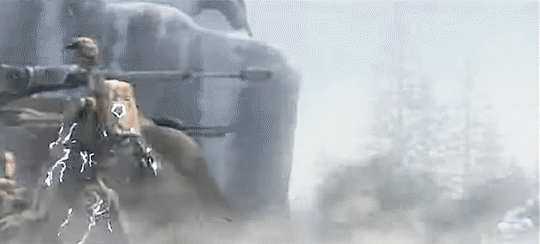
And also the scomping, which could be seen as the 'added/compensating superpower' trope. But narratively it's no different than if he was plugging in with a hacking gadget of some kind (he didn't necessarily "need" to lose his arm for it) and it’s not like Echo is completely defined by this skill. Personally, I think it's well worth the positives of him actually having a visible and realistically impactful amputation.
I see a lot of posts or comments out there that say stuff like “how come Echo doesn’t get a hand?” or fanworks that do give him one and I just think it’s a bit of a shame. If he did get a robotic hand, it just would have disappeared the same way his legs and Anakin’s arm did (aside from that one time he got yoinked by a magnet). When Echo did “get a hand” in the last two episodes there were comments like “yay he finally got a hand! but it doesn’t even work” but I was actually so relieved that it didn’t! Bc for one thing that wouldn’t make any sense, he grabbed it off a droid, it wasn’t designed to implement with his scomp, that would be really complicated. But more importantly because it again refused to erase/cure his disability! It functioned like a real-world cosmetic prosthetic (useless beyond appearance) which is exactly what he needed it for, so that he could blend in better with his disguise.
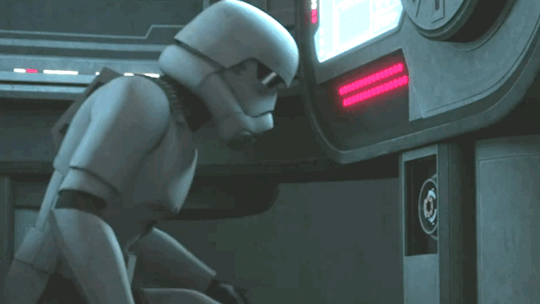
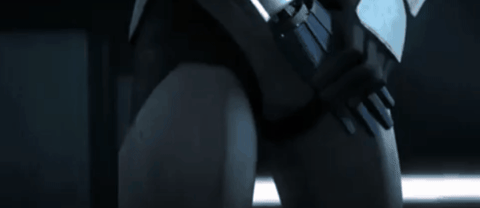
And he continually took it off throughout the episode and ditched it at the end. He only used it for the necessity of a stealth mission, he doesn’t feel the need to visually “fit in” in his daily life.
And, last but very much not least, he made a dad joke and from my intel that is very accurate representation!
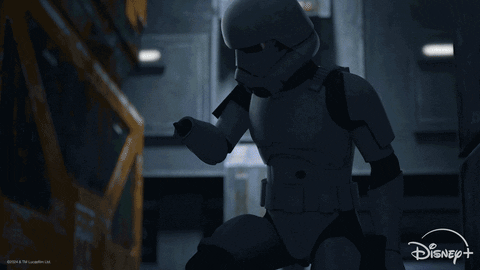
TLDR: Echo’s scomp is actually really cool from an amputee representation perspective, especially within Star Wars, and I think that deserves some appreciation
#man i just love him so much!#this post ended up ten times longer than i was expecting lol#its so strange to me that the same team that completely noped his prosthetic legs also gave us such good arm amputee represention#like whats up with that?#echo's scomp appreciation#also so glad those weird mod arm attachment things from the action figures never happened#representation matters#disabled lives are worth living#disability representation#amputee#disability tropes#robotic limbs#ableism#star wars#clone wars#the bad batch#sw tcw#arc trooper echo#tbb echo#tbb season 3#unwhitewashtbb#long post#accidental essay#analysis#thoughts#imo#rant#character analysis#writing disabled characters#writing
272 notes
·
View notes
Text
The TTPD Deep Dive (Part ?)
It’s no secret that I have a lot of Thoughts about The Tortured Poets Department and it has lived rent-free in my head since it came out earlier this year. I’m absolutely blown away by how underneath the chaos, it’s actually an exceptionally cohesive story and is probably the closest to a concept album Taylor has ever done.
There are so many themes that have stood out to me over the last five months, and there’s one in particular that I think not only drives the entire album, but ties into previous albums to help deepen understanding of it.
This is it, my fangirl magnum opus, my months of posts consolidated into one place. This is also my disclaimer that this is just my interpretation of the album, and my summary of the story it tells, and I don’t pretend to have any special insight or authority. I’m not saying I’m correct at all, do not take any of this as fact, it’s just what it sounds like to me, and these are my silly not-so-little thoughts about it.
(Under a cut because it’s way too long and involves discussion many may not care for or be sick of.)
Come one, come all, it's happening again (I'm thinking too hard about Taylor music)
The overarching theme in TTPD to me is: Grief. If you’re looking at TTPD as a story being told (instead of just as someone’s real life), the inciting incident of TTPD is loss, and the grief from that loss is what drives the narrator’s actions and the fallout, as well as unpacks those complicated feelings and how they apply to the her life in general. By the end of the standard album, it’s also about recovering from that pain, moving on from it and learning from it.
The loss specifically is the loss of the dream of having a family (with one’s partner). One thing that is abundantly clear both on the top line and under the surface in TTPD is how Taylor (as a person and as narrator) longed not only to for marriage but specifically parenthood, and the fear and then realization of losing that chance absolutely wrecked her— which is why the next lover’s (the conman's) wooing worked so well, because it preyed on that yearning. Yet that loss also dovetails into the grief of many things: of youth, of idealism, of relationships, of ideas, even of self, which causes almost a deconstruction of a belief system to piece one’s life back together by the end.
THE CONTEXT
TTPD weaves in the topics of marriage and motherhood both explicitly and in the subtext, in various forms and scenarios. The cheating husband in “Fortnight.” The wedding ring line in “TTPD” the song. “He saw forever so he smashed it up” in “My Boy Only Breaks His Favorite Toys.” All of “So Long, London.” Running away with her wild boy in “But Daddy I Love Him,” fantasizing about weddings and joking about babies. The imaginary rings in “Fresh Out The Slammer.” The cheating husband (again) and the friends who smell like weed or “little babies” in “Florida!!!” “You and I go from one kiss to getting married,” “Talking rings and talking cradles,” and “our field of dreams engulfed in fire” in “loml.” (And arguably: “I wish I could un-recall how we almost had it all.”) “He said he’d love me all his life, but that life was too short,” in “I Can Do It With A Broken Heart.” They may not sound like much on their own, but they paint a picture about how the topics pervaded her thoughts and her writing, and in many cases express her desires, and her pain.
It’s something that goes back several albums when you pick up on context clues. You get the first hints on Reputation with “New Year’s Day,” and “you and me forevermore.” Then Lover is very forward with it: “Lover” is basically wedding vows, “Paper Rings” is very engagement-coded, “I Think He Knows” is cheeky but low-key “you better put a ring on it,” “It’s Nice To Have A Friend” has wedding/marriage imagery in the last verse. As a self-professed diaristic writer, it’s the type of stuff one presumably doesn’t put out there unless those conversations have already happened, and she was very excited about it at the time it was released.
Then the pandemic happens and folklore comes out, and while there is still happy love there (“invisible string”), there are also the first indications that something has happened to put a halt to whatever future she once dreamed of (“hoax,” “the lakes”) and that she’s trying to reassure herself and him that it can still happen even if she’s scared it might not (“peace”). Notably, as far as I can remember it’s the first time Taylor explicitly brings up the idea of family (with her partner) with “you know that I’d give you my wild, give you a child,” which stood out at the time because it’s so incredibly vulnerable, but it’s even more poignant when you really take in that the whole song is like a confession of her deepest worries, and this is her vowing to give him these things that she holds most sacred if he’ll let her. These are what she cherishes most dearly and wants to return in kind: her youth and commitment (my wild), the family she craves (a child), unconditional support (swing for the fences/sit in the trenches) and understanding/compassion (silence that only comes when two people know each other).
Evermore follows an even darker path, and suddenly the album explores relationships that end and grappling with loss. There are toxic relationships (“tolerate it”), dangerous marriages (“no body, no crime,” “ivy”), failing/broken relationships (“Coney Island,” “champagne problems,” “happiness,” “‘tis the damn season”), as well as grief (“Marjorie,” “evermore”). Even some of the happy songs have uncertainty in them: in “willow” she’s begging for him to take her lead, like she’s still trying to decipher him and ask him to commit; in “cowboy like me,” still a beautiful love song, she’s thinking, “this wasn’t supposed to work and we were supposed to bail on each other but we fell in love instead”; “evermore” is about the depths of severe depression (and more) with the love story being the one saving grace in her darkest hour. And it’s also notable that after all the “fiction” writing, shortly after this album she writes “Renegade” where she’s telling the subject: I’m ready to start the next phase of our life now, why aren’t you? Is it me you don’t want after all? It’s like there’s something telling her that this stall might not just be a stall.
Midnights is a jumble (in a good, but in hindsight, also sad way) with the “sleepless nights” concept, but it seems pretty clear now that the themes and events and relationships she was revisiting tied into a lot of what she was feeling in her present life. I wrote the cliff notes version awhile back, but she’s questioning so much of her life that’s reflected in past events and relationships. Am I actually always the problem? How did we lose sight of each other and what we had? We only seem to work when we block out everyone and everything else. Can we ever go back to when things were good? Why are you neglecting me? I once thought I was going to lose everything but you saved me in the nick of time, can that happen again? I chased my career, but did I give up my chance at having a family in the process? Nobody knows what I really suffer from behind closed doors and I’m all alone.
And so on, which in retrospect now that we have TTPD, is very much what she was grappling with in private while writing and releasing the album. The inspiration behind the songs may have been different events and muses, but regardless of their origins they all end up feeling too familiar, like she's seen this film before (ahem). We’re seeing her view of commitment change too, or rather how she writes about it: she’s not making the outright declarations of it like on Lover, or even the implied ones on folklore, nor is she talking of the dark side of it like evermore. For the most part it’s a return to the early days of some relationships, before things got hard, or the end of them when there was nothing left, and also pushing away the discussion of it altogether by the outside world. “Sweet Nothing” is a sweet slice of life, but even at that, it’s the peace of the home in conflict with the pressure of the outside world. Now that we have “You’re Losing Me,” which was written at the same time as the rest of the album, we can probably deduce that she was going back to the start because something happened that made her doubt the future.
THE SETUP
So much of Midnights directly ties into TTPD, and I said in the post I linked that it’s like Midnights is asking the questions that TTPD answers. But there’s one song in particular on Midnights that sticks out to me as being key in the broadest sense to understanding the state of mind that led to the events of TTPD, and that’s “Bigger Than The Whole Sky,” because the way it expresses grief is reflected in the theme of mourning a life built and the dreams along with it that are never realized in TTPD. There are several instances in TTPD that are basically variations of: “every single thing to come has turned into ashes,” and that’s what makes her snap, and leaves her vulnerable to someone who promises her those things when she’s bereaved at losing them in the first place. (In other words: “the deflation of our dreaming leaving me bereft and reeling.”) The song tells a story about how that loss of hope colours one’s entire mindset, and in some ways is a bridge to TTPD to understand what such a low point feels like.
I think that that grief, and most importantly losing hope for an imagined future in its wake, is fundamental to understanding TTPD on so many levels: both the decline with one partner that kept her hanging on then led her such a dark path, and why she fell for the conman's apparent bullshitting because it offered an express pass to what she was losing with her partner. And I also feel like it plays a part into the ruminating she’s doing all over Midnights, trying to make sense of where she finds herself when she’s writing the album, which directly leads to “You’re Losing Me.” Loss permeates so many of the stories on Midnights: of lovers, of innocence, of youth, of faith, of control, of life’s work, etc. “BTTWS” is just one of the ways in which it is expressed so fully, capturing that deep depression and subsequent extinction of faith in something that once felt assured and very much wanted. (Which is also mentioned in her writing process in the “Depression” playlist on Apple Music.)
If you understand why that feeling of loss in general across so many parts of life is so important to Midnights, then it illuminates so much about the “narrative” in TTPD too. If on Midnights she’s wrestling with the seeds of grief and loss (on multiple fronts), TTPD is her reckoning with it in its full form. “So Long, London” is the song that is the most explicit about it: How much sad did you think I had in me? How much tragedy? Just how low did you think I’d go before I’d have to go be free? You swore that you loved me, but where were the clues? I died on the altar waiting for the proof. It’s the sequel to “You’re Losing Me.” It’s, the air is thick with loss and indecision, I know my pain is such an imposition, I’m getting tired even for a phoenix, all I did was bleed as I tried to be the bravest soldier, I’ve got nothing left to believe unless you’re choosing me, my heart won’t start anymore, but from the other side of the break.
This is highly speculative, but if you follow the thread about the topic and the relationship as told from Rep through TTPD, in broad strokes it goes: young love with a serious connection (Rep) -> growing up and making life plans (Lover) -> something happens that delays those plans or makes them grind to a halt (folklore) -> serious doubts arise and cause a loss of faith in their future (evermore) -> struggling with the loss of that future and trying to make sense of the problems in a last ditch attempt to save the relationship (Midnights) -> fallout from that grief after the blowup of the relationship (TTPD). Understanding that progression of events (through the music) explains not only the storytelling side of TTPD (e.g. the jump from the partner to the conman) but also how the experiences/muses blend in the music, and how the music that on the surface is about the short-term relationship is really driven by the destruction of the long-term one.
Following the music, it’s IMO implied that Taylor (the narrator) was holding out for marriage and family with her partner, for years, and it seems like it was at one point a shared dream until something happened to pump the brakes, and seemingly on her partner’s end. And extrapolating further, given how the sorrow expressed in former albums bleeds into TTPD, it sounds like a plan that had been concrete in some form before it had fallen apart, and losing something that once felt so tangible is what drives her in her grief to find any kind of respite from the pain. Which is why the situation with the conman becomes so appealing as the one with the partner splinters further and further.
(If everything you’ve once touched is sick with sadness and you don’t want to be sad anymore, what are you left to do?)
THE STORY
So (one part of) the story kind of sounds like this from the standard album: the relationship with her partner as well as his mental health slowly deteriorate and he withdraws emotionally (“London,” “Fresh Out The Slammer”) and physically (again, “London,” and “Guilty As Sin?”) and takes his resentment out on her (“London” and arguably “My Boy Only Breaks His Favorite Toys” even though I don't want to get into muse speculation here). As she sinks deeper into her own depression as a result, the weight of the failing relationship starts feeling like a cage— or a noose (“London,” “Guilty”), but coming to terms with the loss of their life together and the future they’d dreamed of was killing her (again, “London,” but also “I Can Do It With A Broken Heart”).
Enter the conman who she reconnects with at the very point where this is coming to a head (knowing that IRL she reconnected with him around the time Midnights was being worked on) , and if you read between the lines, she confides some deeply personal things to him (“Down Bad” and “hostile takes overs”/“encounters closer and closer,” “Smallest Man” and the entire sleeper cell spy imagery which is one of my favourite things and I could write a whole essay about the meaning of it, “loml” and “A con man sells a fool a get-love-quick scheme”). Then after she’s confided these secrets to him, he insinuates himself back into her life (“Guilty,” “Down Bad,” “Smallest Man”) and sells her a dream that HE can give her all these things she hopes for (again, “Down Bad,” “Smallest Man,” “loml,” song “TTPD,” “Broken Heart”).
But the thing is, he only knows these are the things she wants because she’s revealed it to him, and presumably, told him that was what she was losing by staying with her partner. And instead of the normal response of, “that is really sad that your partner is not supporting you and you deserve to be treated better,” to a friend in growing distress, it seems like it was, “well I can give you all those things!!!! Right now!!!! Trust me!!!!” And worked on her until she believed it, and jumped at the chance at a precarious time in her life. And one thing I want to underscore is: Taylor has agency in the situation always, it’s not like she’s been kidnapped and brainwashed. (In fact, she implores on songs like “But Daddy” that SHE is in charge of her own choices, good or bad.) She chose to rekindle the friendship and then relationship, and she chose to eventually leave her long term relationship for another man, and she reiterates on the album that she owns this all. But it’s also: nothing exists in a vacuum, and she makes choices based on emotions and information she has at the time, which is why it gives so much whiplash.
THE ALBUM
When you look at it as, the situation with the conman only happens because of what happened with the partner first and that the appeal of the conman and the fantasy he sells her is a direct reaction to that, it makes the “swirliness” of the music make so much more sense. And for much of it, even many of the “conman” songs on the surface are really “partner” songs underneath.
Fortnight
A suburban gothic allegory about a broken marriage with a distant husband with a wandering eye, which makes the rekindled romance with the neighbor so appealing. She’s miserable caged in her stifling house because she’s been abandoned by her spouse, so the reappearance of this past love reignites the passion that’s dead at home.
TTPD
“So tell me, who else is gonna know me?” “I chose this cyclone with you.” I’m gonna kill myself if you ever leave. Everyone knows we’re crazy. She’s laying it out there that she’s already in a dangerous state of mind, and she’s actively putting herself in more danger by pursuing the conman. “At dinner you take my ring off my middle finger and put it on the one people put wedding rings on, and that’s the closest I’ve come to my heart exploding,” spells this whole thing out so clearly: whether it’s an actual event (likely) or a metaphor for the promise he makes to her, the reason why it makes her heart explode is because it’s the thing she’s been waiting for forever with no movement, and here this person comes in and slips it on her finger in an instant like it’s nothing. (And eventually, as we’ll come to know, it is absolutely nothing to him.) You mean it could have been this easy this whole time?! (Well, no. Not until a certain other suitor makes his appearance later.) It feels like she’s finally getting everything she wanted in the blink of an eye! How lucky! How convenient! What was that about the get-love-quick scheme you say? (Unsaid: the reason why this feels so urgent is because there’s a sense that time is running out in so many aspects of her life and not just the obvious. Which reappears later on.)
Down Bad
“Did you really beam me up in a cloud of sparkling dust just to do experiments on?” sets the scene for this euphoric experience in the moment that starts to feel violating once the dust settles (which is then followed up in “Smallest Man” and the spy mission on her). The bridge spells out how he weaselled his way into her life, preyed upon (intentionally or not) her emotional state, sold her a dream and then vanished, without the benefit of hindsight yet we see later in the album.
The alien abduction metaphor is pretty brilliant, because it shows both how she was desperate to escape the place she found herself in, and how much it screwed her brain to then be left stranded when the affair was over. “[I loved your] hostile takeovers, encounters closer and closer,” is so evocative because it details how the situation came to be: his overtures under the guise of friendship blurred lines until he made her an offer that she eventually couldn’t refuse (hostile takeovers) as he infiltrated her life more and more intimately. The sad thing is that the song has parallels to how her relationship with the partner started too in earlier albums, in that they ran away to live in their own bubble (or planet) only for him to metaphorically abandon her as the years went on. (Oven, meet microwave.)
My Boy Only Breaks His Favorite Toys
Being continually emotionally broken down by a person who knows he’s hurting you but still acts the way he does. (The original voice memo version makes this even clearer and it’s rather heartbreaking.) “He saw forever so he smashed it up,” speaks to the loss of a future the person became scared of, and the original lyrics (“he saw forever so he blew it up”) somehow cut even deeper to me because it feels so much more intentional.
Also in the original version, “he was my best friend and that was the worst part,” also speaks not only to the loss of an entire partnership in the wake of this hurt, but also to the feelings of betrayal that the person you trust so deeply has the ability to hurt you in this way too, and how it’s a one-two punch of not only losing the relationship but also your closest confidant. (It’s like the sequel to “Renegade” and the missiles firing to me.) Again, there are shades of both/many situations in the song, pointing to an unfortunate pattern in some ways. The situation in “My Boy” is part of why she was so low, and why the “get love quick scheme” was so appealing later on. And it dovetails nicely into…
So Long, London
The most explicitly “partner” song that puts a coda on “You’re Losing Me,” and is Track 5 because it’s the emotional underpinning of how she got to where she was, and drives the events of the rest of the album. It spells everything out: He withdrew, she tried to fix it for both of them, eventually even that stopped working, he was oblivious to or minimized how badly she was suffering and his (in)actions couldn’t reassure her, he wouldn’t move forward on their future plans and stewed in his own struggles, she was spiralling out of control trying to hang on and ultimately felt like she was going to die if she didn’t leave.
But Daddy I Love Him
Like a direct reaction to “So Long, London” in that she breaks free from the death of one relationship and throws herself with reckless abandon to the next, fuck the haters. How dare you judge me, when the relationship you think I should have stayed in was killing me? (Dutiful daughter all the plans were laid. All you want is gray for me.) Fuck all of you, I’m going to choose whoever I want! (So what if I have a baby with HIM, huh?! I tried doing it the proper way and look where that got me so now we're back to square one) It’s again her imagining how wonderful and freeing this “wild boy” is going to be for her, and how wrong she’ll prove everyone. THIS TIME she definitely got it right. So what if she has to run away! So what if she scandalizes the whole town! They don’t know what she really wants or needs anyway! She’s the only one of her (hee-hee-hee) and she’s the only who gets to decides how this goes. (Because: she longs for control in a situation she’ll eventually realize she has little of it in, which we’ll find out is a recurring theme in her life.)
Fresh Out The Slammer
Also spells out what happened with the partner in the first verse and the pre-choruses, which is what makes the conman so appealing as the imagined jailbreak. The bitter loneliness vs. the sultry passion she builds up in her head as she awaits her release from prison is key to understanding the two sides of the story in the album. There’s this whole outlaw imagery (which is also carried through in “I Can Fix Him”), but it’s contrasted in the end with her and her reunited lover sitting on park swings like children with “imaginary rings” — because “Ain't no way I'm gonna screw up now that I know what's at stake.” What’s at stake is lasting love and the promises that come with it (marriage/family) that are precious and time-sensitive. The imaginary rings are both a nod to the youthful dreams of her and her new/old lover, but also has a double meaning to me because those promises aren’t built on anything together; they're made up, intangible. (They’re no more concrete than the plans that went up in smoke with the partner.) Like with most of the conman situation, it’s all a fantasy in her head that has yet to happen, and as we find out later in the album, reality ends up leaving much to be desired.
Florida!!!
Broadly speaking, it’s running away from your problems and wanting to disappear from your life. (But again: the life she’s disappearing from is the cheating husband she may or may not be feeding to the swamp-- another miserable marriage.) What kind of flies under the radar though is the “I don’t want to exist,” line, which points to her dire state of mind that led her to fleeing to that metaphorical timeshare down in Destin. In many ways about cheating death.
Guilty As Sin
Yes it’s the “masturbation song,” but again the nuance is that she’s left to pleasure herself because her partner has abandoned her emotionally and even physically, i.e. “my boredom’s bone deep.” To be blunt: they aren’t even intimate anymore, so she starts fantasizing about the guy she used to have chemistry with who’s reentered her life and is making moves on her. And realizing that she’s now finding release in another man (albeit imaginary) breaks her even as it reinvigorates her because she finally understands that the relationship she’s in is effectively dead. (“Am I allowed to cry?”)
Who’s Afraid of Little Old Me
This isn’t about relationships, but about society and its reaction to them in a general sense. But again, she’s left to stew in all this anger and hurt as she’s been abandoned at home, then abandoned by public opinion, and the public attack on her is part of the origin as well as the end of that story. The trauma inflicted upon her detailed in the song is the reason why she felt trapped in the first place, which led to the decisions she’s made and habits she’s leaned on ever since.
I Can Fix Him (No Really I Can)
This is one of the few songs that is the most completely conman-coded, and shows when the delusion finally breaks at the end of the song. She spends the whole song being like, “no really, I alone can make him better! You’ll see! I know he’s gross, but he’s mine! It’ll be fine I swear! You don’t know anything! Uuuuuum hmm wait actually what the fuck—“
Loml
Oof. THE song. Again the surface reading is about the “conman” who comes in and sells her the lie, but the pain is because all the dreams she writes about are HER dreams and implied that they were the dreams she built with her partner that the conman sold back to her. I could do a deeper dive on this but most of the song is applicable to both relationships, which not only shows the “swirliness” of her writing, but also how they both ultimately did the same thing to her in different shades.
The bridge and the last chorus are kind of fundamental to understanding it all, and her ending it with “you’re the loss of my life” is about, among other things, how falling for this trap blew up the life she built and dreamed of for good. (I could talk about this one forever.) “You shit-talked me under the table, talking rings and talking cradles” to “Our field of dreams engulfed in fire” is a hell of a line and progression, and again, indicative of what the real driving force behind the whole album is. The shit-talking is because he took her dreams (of marriage and children) and hyped it back up to her tenfold whether in a moment of his own delusion or for more nefarious reasons — much like how the man prior kept promising these things but never followed through, which left her vulnerable to someone who appeared to offer them enthusiastically. The field of dreams isn’t just the one with the conman, it’s the one with the longterm relationship she’d built the dream with in the first place, because the conman’s actions are part of the reason the LTR went up in smoke. (Not the reason for the rift, but the consequence of the final break.) And THAT is why it’s the loss of her life, so completely.
When she says “I wish I could un-recall how we almost had it all,” IMO it’s not just the fake future that the conman lures her into, but also (and perhaps mainly) the once-real one she had with her partner and the loss of which that made her susceptible to falling for the con in the first place. There’s honestly so much between the lines in this song that covers every theme and speaks to the grief of seeing the life she imagined slip away, slowly by the first man then annihilated by the second.
I Can Do It With a Broken Heart
The juxtaposition of “He said he’d love me all his life, but that life was too short” and “He said he’d love me for all time, but that time was quite short” sums it up to me (and parallels “loml”), because they are two different situations, but they cut her just the same. In the first, “that life” IMO was the life they’d built with the dreams that went along with it and it was too short because he never followed through, and in the second, the “time” was quite short because it was the frenzy of the whirlwind romance that fizzled as quickly as it began. The life that was too short led to the time that was quite short.
The Smallest Man Who Ever Lived
This is definitely THE conman song. The rage, the shame, the violation, it’s all in there. But the key to it is the bridge and the espionage imagery woven through it. A honeypot scheme is when spies target a mark and seduce them to gain their trust and their privileged information for their homeland. So her likening him to a sleeper cell spy who set her up just to mine her deepest secrets and use them against her is a heavy, loaded statement. And implied: that valuable information she unknowingly held were her longings of marriage and family (the aforementioned shit-talking about rings and cradles she never got to have), and more importantly, those dreams preceded him reentering her life and then beginning his mission on her.
The insinuation then is: she confesses these are her deepest wishes which are now seemingly unattainable in her current situation (e.g. with her partner) -> he convinces her HE will give them to her and make the dreams she pines for come true -> she falls for him and blows up her life to make it happen -> he gets what he wants (thrill of the chase/sex/the idea of her/whatever his intent was) -> he abandons her when he gets what he wants, or rather it isn’t what he wants or can handle -> she’s left a) all alone b) with dreams unfulfilled c) with no answers d) feeling used at having her most sacred wishes used against her.
Again, the song is unquestionably about the way the conman absolutely destroyed her, but he was able to do that because there was this thing she wanted more than anything, that was dying in her previous relationship, that he was able to prey upon to seduce her, then discarded her and her dreams as soon as it was inconvenient for him while absolutely hollowing her inside out. (And again: the devastating thing is that this also applies to other relationships she’s written about, in different ways.)
The Alchemy
Not about either the partner or the conman directly, but it (loosely) touches on her finding herself after the whole oven-to-microwave experience and opening herself up to life and love again. #GoodForHer
Clara Bow
This isn’t about the romantic relationships on the surface, but it is about how damaging the entertainment industry and public life are on women, and how women are only valued for their beauty as commodities until they can be discarded and destroyed in the process. Which I think plays into the circumstances that led her to make the decisions that she did years ago, and why she makes the ones she does now. (But also, being valued for physical traits and appeal for the male gaze brings us to…)
The Manuscript
The “original sin” that kicks off all of this. Again, at first light this isn’t about the partner or the conman, but the person it is about is the reason why she has made all the decisions she has ever since in relationships (and that’s Mr. Plaid Shirt Days from “All Too Well”). The realization that her first serious adult relationship is what cemented these patterns, and this view of herself and her worthiness in relationships, is profoundly sad. An older man who valued her for being so mature for her age and implying that the mature activities ahem associated with that were the performance benchmarks in her ability to carry a relationship, only to leave her, was earth shattering. She placed her faith in this person, but then the way he treated her changed her view of love and of herself.
She took his innuendo about “pushing strollers” as a sign of potential commitment, whereas he ultimately meant it as foreplay, and she was too young and naive to know the difference. So not only did she learn from that that this man (and men) didn’t view commitment and family the way she did and that it was something to be toyed with, but she also learned that her value to them among other things was sex. Imagine being an idealistic 20 year old and your boyfriend ten years your senior tells you, “if the sex is anywhere near as good as our dates have been, we’re going to be making babies before you know it,” (e.g. this is relationship is serious) and then he dumps you: does that imply that the sex was not in fact that good? (E.g. that you’re not worthy after all?)
No, obviously from this side of life, it’s because he was a commitment-phobic playboy, even if he did love her, but she couldn’t have known that at 20 and instead internalized that shame. But, it did send her on a path of how she approached sex and love and relationships for over a decade afterwards. And her coming to the realization that that first act of (perhaps unintentional) manipulation is what informed her actions thereafter helped her break the pattern. Her worth to men is not just sex, she has value and her hopes and dreams have value, she doesn’t have to change into a different person to please anyone, because if that is what they want, they won’t ever want her anyway.
It’s been described here on Tumblr by people more eloquent and astute than I as a song that encapsulates the album as this: one did it slow (partner), one did it fast (conman), and one did it first (first love)— and that is haunting. After years of men minimizing her dreams and desires, if not outright using them against her, she’s finally at the point where she can let it all go and move on for good. (There’s a whole other tangent about consent and shame and manipulation, but that’s an entirely different kind of discussion. But it is so devastatingly contrasted with “you said if we had been closer in age maybe it would have been fine, and that made me want to die.”)
THE SUMMATION
This is just my interpretation of it, but in going through the standard album, it feels pretty clear how cohesive the album is about a story of love and loss and grief, then reckoning with what caused it all in the first place that set a person on this path. It’s a formative experience at a young age that was traumatic and led to certain coping mechanisms and a shaping of one’s self-perception, as well as the reaction to external pressures that try to dictate behaviours and influence how one feels one deserves out of love which makes it harder to know when one absolutely deserves more and better. And leaves one struggling to cope with loss when there isn’t anything else to hold onto. Then in light of one’s life blowing up, learning to find oneself in the aftermath all over again.
On another tangent that is somewhat related to the theme of loss, the way she writes about the two main muses on the standard album also ties into how the situations converged to create absolute carnage on her emotional and mental well-being. With one situation, she’s talking about a concrete life that crumbles under the weight of their struggles; with the other, the entire thing is a fantasy that she builds up in her head, and when it comes to fruition it falls far, far short.
If you look at the “microwave” (conman) relationship, you realize that almost everything she writes about it happens before it actually becomes reality, and it’s mostly her imagining how great it’ll be, but with few exceptions, when she writes about what actually occurred, it doesn’t even come close to living up to her expectations. “Fortnight” is an imagined future where she escapes to Florida and his touch finally starts her stalled engine (ahem). “TTPD” is perhaps the most positive retelling of their time together, but even that implies he was better off stoned and when he sobered up he succumbed to his demons all over again, and more importantly she conveys how she also is in extreme distress, barely concealed by the veneer of being infatuated with him. (E.g. saying to that she’ll kill herself if he ever leaves her — the implication is that she is absolutely serious about it when she “felt seen.”) And that the warning bells are going off in her head, but she feels like this person is the only one she can be with (because they’re equally fucked up and the chaos he brings into her life makes her feel alive when she felt so close to death).
“Down Bad” is the most explicit about being in love, but she’s also left completely confused and disoriented by him disappearing, wondering if any of it was real and the seeds of violation creep into her consciousness (“did you really beam me up in a cloud of sparkling dust just to do experiments on?” “Waking up in blood.”). “But Daddy” is her imagining she can tell everyone to fuck off for telling her what to do with her life. “Fresh Out The Slammer” is her fantasizing about this man while feeling trapped in her relationship — but never in the song is she actually reunited with him; she’s using him as the projection of all the things she’ll make right after being wronged by her partner. “Guilty As Sin?” Is very obviously about her fantasizing about sleeping with him, but again it’s such a minefield for her because it hasn’t happened yet; they’ve only just reconnected. “I Can Fix Him” is the only song other than “TTPD” that shows them actually together, and it’s the one where she keeps saying, essentially, “I know he’s gross but I can rehabilitate him into an upstanding person, trust me,” until the mic drop at the end of the song where it finally hits her that no, she can’t, because this is who he is, not the person she’s built him up to be.
“Loml” is when it all comes crashing down, and the song emphasizes everything he did and told her, e.g. that she’s the love of his life, but she doesn’t return the sentiment in the song about their time together. Because now that it’s past tense, she knows it wasn’t actually love. (And says as much in the album epilogue poem.) “Broken Heart” is her reeling in the aftermath, but again, it’s “he said,” not “I loved.” And then there’s “The Smallest Man,” where she eviscerates him: he also pursued an idea of her but didn’t care much for the real her in front of him (who else is gonna know me?), he love bombed her only to hurt her (crushing her dreams), he was constantly stoned (and not just in the funny munchies kind of way), and he wasn’t even a good lover (despite the fantasy she’d created before). That last point is especially striking because she spent albums singing about the importance of and pleasure in (sexual) intimacy in the relationship with her partner (sometimes to both their own detriment) and how it was at times the only way they could connect, but in this case, the idea she hyped up and acted on in her head about this lover never panned out in practice. She spells it out in the epilogue: it wasn’t a love affair, it was a mutual manic phase.
In contrast, there’s a lot more tangible action in the “oven” (partner) parts of the album, showing how hard she tried to make the relationship work in real life instead of just in her head. All of “So Long, London” is her detailing how she tried to break through to him and support him, even when he rejected it and pushed her away, thinking she could carry them both until they ultimately sank, but she did it because she “loved this place for so long.” (The place? Not just the city, but the home and perhaps most importantly, him.) In “Slammer” she stayed with him even as things disintegrated for “one hour of sunshine.” (E.g. holding onto the rarer good times even as they were fewer and further between, hoping things would eventually turn around.) And like in “London,” she held on despite people in her life pleading with her that it was hurting her. (Which is also echoed in “Slammer.”) In “Guilty” her boredom is “bone deep” because the passion that once drove their relationship (and papered over their problems) has finally gone out too, so there’s nothing left to hold onto, leading to her fantasizing about the new suitor, which makes her realize her relationship has passed the point of no return. “Loml” is about the conman on the surface, but the undercurrent of all the things she says about him is that he was co-opting the dreams that she was clinging onto for dear life in the previous relationship, which is why the con is so painful; the field of dreams he sets ablaze isn’t just the fake painting he sold to her, but the original artifact (her life with her partner) too.
All the physical and emotional labour she puts into the relationship with her partner ends up reflected in the fantasizing she does in the one with the conman, which is why it is so confusing in the moment and so lethal when he leaves her without any answers. She wants to get married and start a family with her partner which keeps getting stalled; the conman mock-proposes which makes her think he’s immediately serious (“TTPD,” “loml”). She feels caged by having to hide with her partner and shrink herself; the conman promises he’ll stand by her side publicly and let her shine (“Smallest Man”). She sinks into a deep depression in her loneliness as the relationship with her partner careens off a cliff; the conman convinces her they’re meant for each other in a them-against-the-world way (“Down Bad”). The intimacy (in all senses of the word) in her relationship with her partner fizzles; the conman stokes the fire by sending her secret messages and reigniting passion (“Guilty”). She spent years trying to help her partner to no avail; the conman makes her think she has the power to reform him (“loml”). She feels misunderstood by her partner; the conman acts like he’s the (only) one who truly gets her (“TTPD,” “loml”).
In short: there’s nothing that the conman does or says that isn’t a direct response to what her partner did first, and it’s even worse because the conman knew how much her partner’s actions hurt her and he used that privileged information to paint a picture of what he could give her, but in doing so in some ways aimed at her heart with even deadlier accuracy. (I’ve likened it to him borrowing someone else’s life for his own joyride, until he crashes the rental car and flees the scene.) It’s why in the aftermath, the difference in emotions are so different: she feels nothing but rage and violation towards the conman for getting in her head and using her, whereas her feelings towards her partner are more complicated. There’s anger (at her lost youth and being taken for granted), but there’s also sorrow (at their lost life and future), disappointment (that he never could step up the way he’d promised or she’d needed), even compassion (towards his struggles) and a tiny measure of appreciation (for the good times they did share).
When you look at the bigger picture, the story the album paints is just so painfully normal. You have two people (Taylor and her partner) who once loved each other deeply, and despite warning signs early on telling them they have fundamentally different needs and ways of living their lives they fight like hell to make it work (the epilogue) until those warning signs become grenades that destroy their home (“My Boy,” “London,” “Slammer,” arguably “loml”). Having already been through at least one rough patch/break/breakup that she felt almost destroyed her (harkening back to Midnights on “You’re Losing Me,” “The Great War” and “Hits Different”), the final and fatal downward spiral of the relationship (“YLM,” “London”) and the grief over losing that future sends her into a tailspin, just at the time where a flame from the past (the conman) reenters her life and tells her all the things she’s been longing to hear and feel (“TTPD,” “Down Bad,” “Guilty,” “loml”) and, crucially, missing from the relationship that was once her entire life.
So in her panic, she falls prey to the (empty) promises of the past lover (“loml,” “Smallest Man”) and decides he’s actually what will save her from the free fall, because the alternative (that she will end up in a situation she doesn’t think she can survive) is too painful to bear. When she finally acts on these circumstances (leaves her partner/runs to the conman), she snaps, acting on pure emotion and adrenaline (“But Daddy”), but before she knows it, the new lover abandons her, and she’s left to reckon with the fallout of the episode and process everything that has happened (“Down Bad,” “loml”) — with the conman, with her partner, with the choices made in her adult life personally and professionally which leads her back to the moment she feels set her down that road at the start.
The TL;DR of this unintentionally long essay is that the reason the conman affair was so serious was precisely because it was meant to fulfill the promise of what was her life with her partner. To me, a large part of the story is that she projected that life onto the conman (or he projected her life back to her for his own purposes) because she wasn’t ready to deal with that massive grief and the life raft he offered felt like the only alternative to an even darker end. Whether the conman actually believed what he told her, or he went along with it or encouraged it because it served his purpose, we’ll never know, just like we’ll never know the finer details of what went on (nor should we). But no matter what, the album is just an extreme deep dive into all the ways grief can consume us, and whether it’s a long, drawn-out death or a sudden, inexplicable one, it can turn a person’s life into such a trainwreck that they act in ways unfathomable to even them, let alone the people around them. It can also unleash repressed trauma and mental illness that can crater your sense of self. And when those situations are compounded? It makes for a nearly impossible type of breakdown to unpack. (Which is why you might need a 31 song album to process it.)
#What if i told you I’m back lol#Time for me to finally just post the thing after it’s been sitting in my drafts for so long so I can rid myself of it lol#Writing letters addressed to the fire#the tortured poets department#Consider this a treat before Eras comes back for its swan song leg idk#Would you believe that as long as this is#i deleted quite a few chunks of it from the original draft i sent to a friend(s) in the interest of ~propriety~#Because they were a little too rambly and um— ~speculative~/personal/etc and we are flying too close to the sun#And i tried to be as tactful and more or less stick to things we can point to in the music and such#So hope people catch my drift lmao but also iykyk i guess#I have so many other themes I want to talk about but I never have any time#I have so much more i want to say and yet#wavesoutbeingtossed: The Anthology#Also if things get weird i will turn off reblogs/delete the post tbd#This is not an invitation to get into muse ranting or debate in my inbox and I ask that you please respect my boundaries :)#Midnights#lover#folklore#evermore
138 notes
·
View notes
Text
rick riordan you became the thing you swore so much to destroy. why change some of these things in the show??? the thing im most angry about is that the changes are either purely nonsensical or just done poorly
theyve completely eliminated the books sense of urgency, like theres no stakes on anything. you can miss the deadline and everythings fixed with a little talk with zeus. you recognize medusa and crusty and the lotus hotel right out of the gate, and obviously the only conclusion is that kronos is behind everything even though hes supposed to be locked in the deepest part of tartarus and youre a 12yo who just got thrown into this life and is just learning that monsters are real. fights are over in 30 seconds and theres no injuries or consequences except for an off screen comment on how you lost your bag or maybe a new stain on your shirt. theyre 12 but also they know everything there is to know about the greek myths.
in the books they learn and realize things as they go! its the experiences that change percy and grover and annabeth and things are supposed to be HARD because theyre kids!!! and they were sent on a mission they shouldnt have been sent on, but they get through it with each other and with a sense of comedy because theyre fucking kids! yea theyre gonna almost die and then say hello to gladiola the pink poodle, and play hacky sack on the bus stop, and stuff themselves with cheeseburgers every chance they get bc kids arent supposed all knowing and mature all the time
you cant promise a faithful adaptation of a book and then change the basic things that made the book be loved in the first place
#i could complain even more and i will tbh#i can still complain more abt the tone of the show and the pacing before even getting started on the characters themselves#like rick fell into the stereotypes he obviously was trying to destroy#annabeth became an all mature girl who knows everything and had her kid traits basically erased#percy now knows everything too to show hes not as dumb as ppl say he is#and grover is divided in this weird amalgamation of comedic relief and manipulation mastermind to do exactly what?#everythings been sanitized to all hell and all violence has to be shown in a controled setting that erases any actual evidence of it#rr crit#pjo show crit#pjo tv show#pjo tv series#pjo tv crit#pjo#rant
395 notes
·
View notes
Text
Jaiden: Cucurucho, you have a lot of power, right?
Cucurucho: ...I don't know. Maybe.
Roier: Ah... Yes, you know, don't act like a dumbass, you have it. You have it, man. Eh?
Jaiden: Is there a way for us to protect all the Eggs? Do you know? I don't want anything to happen to the Eggs that happened to Bobby.
Cucurucho: Ha ha ha
Roier: WHAT? [Smacks Cucurucho]
Jaiden: [Bops him] Headpats.
Cucurucho: Maybe.
Jaiden: [Continues to bop him] Headpats. C'mon, I can get it out of you! Headpats! Chin scratches! Belly rubs!
Roier: [Joins Jaiden in bopping Cucurucho, chuckling and laughs]
Jaiden: Yeah? He's comin' around!
[Jaiden and Roier both laugh]
#Jaiden Animations#Roier#Cucurucho#QSMP#Jaiden#Animations Family#There is. So much I could say about these three#and so much I could say about their relationship / interactions with Cucurucho and Osito Bimbo#Cards on the table... I really would have loved it if Cucurucho / Osito genuinely cared about Jaiden#I mean I know they DID care about her to some extent that much is clear#But they / the Federation were also ABSOLUTELY using her. I'm not arguing that they weren't#But how could anyone not be charmed by Jaiden? The boba the tea parties the head pats–#The empathy and kindness and everything that made q!Jaiden who she was–#Cucurucho and Osito were tools of the Federation but I do want to believe they cared about Jaiden. Albeit in their own fricked up way#I dunno. I know this sounds like massive copium probably but I watched all of her and Roier's streams interacting with them#and I personally think that conflict and duality makes for a more interesting story#But that's just me and my own personal biases. I dunno how to properly put it into words but I am cradling them all close to my heart#I loved Cucurucho / Osito and I thought they were interesting and I'm SO SAD we'll never know what Jaiden did for them in the past#Anyways. For anyone who's read this far into my rant– you know how Cucurucho saved the Eggs and Jaiden said she died in Purgatory?#I like imagining that she survived the bomb and wound up finding the Eggs in the aftermath#and she helped them survive until Cucurucho found them#I imagine that Jaiden was the reason they were able to escape from the Island / The Watcher / ElQuackity#She stayed behind to slow down their pursuers. And Cucurucho rescuing all the Eggs fulfilled his agreement with Jaiden—#A promise to protect the Eggs#Like I said a lot of this is copium but that's what I like imagining#TLDR: Cucurucho / Osito did care about her in a weird way but that doesn't mean they weren't manipulating her#May 31 2023#Idk man I got a lot of emotions about q!Jaiden#Roier too but I feel like I've done way more analysis posts about him and Cucurucho. Jaiden needs time in the spotlight#Anyways there's my monthly tag rant
125 notes
·
View notes
Text
for @dancinbutterfly who requested this, but also any non tvc book readers who may be curious... here's some excerpts from the scene in the vampire armand where a bunch of guys are bidding for which one of them gets to fuck amadeo and marius encourages it / treats it as a game / commands amadeo to kiss one of them while he kills him. imho this is a part of the text the show writers likely drew inspiration from for the idea of marius 'donating' amadeo.
for reference, these are all taken from chapter 5! so @dancinbutterfly you can direct your friend who doesn't believe this was in the text there.
how do i even begin to content warn for this, it's so fucking BAD. i guess the usual tva warnings for grooming & csa, sexual assault, pedophilia, kind of incest?, slavery, just... marius bein' marius y'know. (IT'S REALLY BAD. like i do just want to emphasize for anyone who has not read tva it's quite explicit and upsetting plz be aware):

-



-

-

-

-

-

-

-

-

-

-

#literally what the fuck even is this scene. it's so horrific but also so DEEPLY weirdly written. like almost incomprehensible.#it seems like it doesn't make sense because i'm excerpting but the bits i cut out don't make it make any more sense. it's mostly just#ranting about the siege of constantinople.#it's all vivid and nightmarish and weird and makes no sense whatsoever#anyway.#marius die in a fire for real this time#interview with the vampire#the vampire armand#tvc#rose reads tvc#IN CONCLUSION: ANNE WHAT THE FUCK.
87 notes
·
View notes
Text
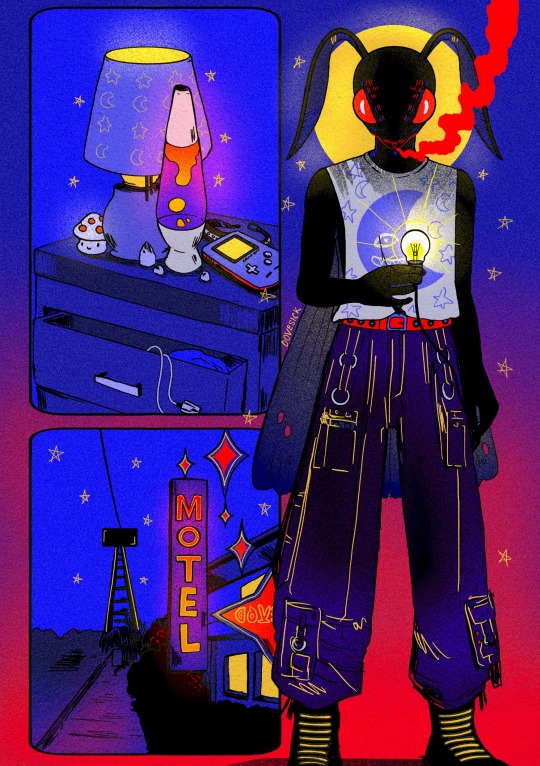
mothman in the glittering night
#anthro art#furry art#mothman#bug anthro#weird art#idk man thinking of tags is hard#i haven’t used bright red. blue & yellow in so long#maybe like a year#i used to love this colourscheme#it was fun to use it again#& just draw some glowing art. i always used to make glowing art#& something inside me snapped with the last one#i wanted to experiment more & not just do what i thought would succeed on ig#i absolutely hate that site with all of my being#i’m rly considering leaving#lol ranting in tags but whateva
663 notes
·
View notes